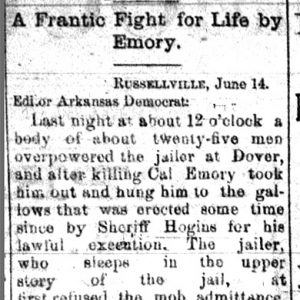calsfoundation@cals.org
Cal Emory (Lynching of)
Cal Emory was lynched in Dover (Pope County) on June 13, 1881, after his sentence of death was commuted to twenty-one years in the state penitentiary.
Cal Emory’s name is rendered a number of different ways in newspaper reports. Some give his last name as Embry or Emery, while others have the first name “Cal” being an abbreviation of either Calhoun or Charles. The 1880 federal census records Cal Emory, age twenty-eight, residing at the time in nearby Ozark (Franklin County) as a prisoner, and the June 9, 1881, Russellville Democrat reported that he was a resident of Franklin County.
According to the Arkansas Gazette account of his lynching, Emory “and a partner first raped and then murdered the woman Embry was going to marry.” According to correspondence published in the August 17, 1879, Arkansas Gazette, Emory and a man named James Youngblood had, by that point, been wanted by Franklin County authorities for about a year for having “ravished” a woman by the name of Taylor (one report names her Mrs. Taylor) and then murdering her and throwing her body into “the river” (presumably the Arkansas River, however one source states Mulberry Creek). The local sheriff located the two men and arrested them on August 13, 1879. Youngblood was tried at Ozark, convicted of murder in the second degree, and sentenced to twenty-one years in the state penitentiary.
Emory was convicted at the October 1880 term of the Pope County Circuit Court, having obtained a change of venue, and was sentenced to die, with the execution scheduled for December 17, 1880. Emory’s lawyers appealed the verdict and lost, and by the time Governor Thomas J. Churchill commuted his sentence in early June 1881, the gallows had already been constructed to carry out his execution. Following the commutation, which the Russellville Democrat called “an outrage upon public decency,” Emory was held at the jail in Dover, and several attempts were “made to get him out of the jail by men whose only object was to send the criminal to his last resting place. These attempts were frustrated by the guards.”
However, on the night of June 13, 1881, a mob overpowered the guards and led Emory “towards the scaffold that had been erected for him, but remained a ghastly witness of the clemency of the governor.” The leader of the mob demanded that Emory climb the steps to the gallows, but Emory refused, saying, “I will be d—d if I do.” As the Gazette reported, “So many ineffectual attempts had been made to get the unfortunate man out of the jail that the crowd became impatient at the delay, and whispers ran round that something had to be done very quickly, or assistance would arrive for their victim.” After Emory refused a second time to ascend the steps, one of the mob fired a gun at Emory, striking him in the forehead, which led to several other shots being fired into his body.
With Emory now wounded, members of the mob “seized the bleeding and groaning murderer and hurried him up the steps of the scaffold” (though a special telegram to the Gazette, appended at the end of the initial report, states that he was probably dead by this time). There, they fixed the noose around his neck and sprang the trap. Emory’s body hung there until the following day. As the newspaper reported, “No clue has yet been obtained to the perpetrators of the outrage.” The National Republican of Washington DC reported that the mob was “thought to be from Franklin County, and to be friends of the murdered woman.” The Russellville Democrat insisted: “There is no evidence that a citizen of Pope county participated in the lynching. The man was confined in our jail, because he had been tried in our court on a change of venue from Franklin county. No stain can possibly rest on this county. It is unfair, unreasonable and base calumny to charge so.”
For additional information:
“Arkansas State News.” Arkansas Democrat, December 3, 1879, p. 1.
“Cal Emory Lynched.” Russellville Democrat, June 16, 1881, p. 3.
“Circuit Court Notes.” Russellville Democrat, October 7, 1880, p. 3.
“Circuit Court Notes.” Russellville Democrat, October 14, 1880, p. 2.
“Circuit Court Notes.” Russellville Democrat, October 21, 1880, p. 2.
“Death in Horrible Shape.” Arkansas Gazette, June 15, 1881, p. 4.
“Local Paragraphs.” Arkansas Gazette, August 17, 1879, p. 8.
“Lynch Law in Arkansas.” National Republican, June 16, 1881, p. 1.
“Press Comments on the Lynching.” Russellville Democrat, June 23, 1881, p. 2.
“To Be Hung until Dead.” Western Immigrant (Dardanelle, Arkansas), October 23, 1881, p. 2.
Untitled. Russellville Democrat, February 19, 1880, p. 2.
Untitled. Russellville Democrat, June 9, 1881, p. 3.
Untitled. Russellville Democrat, June 23, 1881, p. 2.
Staff of the CALS Encyclopedia of Arkansas
 Law
Law Post-Reconstruction through the Gilded Age, 1875 through 1900
Post-Reconstruction through the Gilded Age, 1875 through 1900 Cal Emory Lynching Article
Cal Emory Lynching Article 



Comments
No comments on this entry yet.